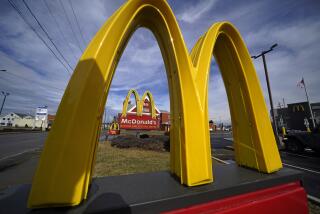Burger Wars Taking a Bite Out of Profit
- Share via
The nationwide burger wars, waged mostly in multimillion-dollar television commercials, are hitting some hamburger chains on the bottom line--forcing layoffs and losses.
Burger King announced Tuesday that it has laid off 107 people--about 15% of its corporate work force--at its Miami headquarters in an effort to save $2.8 million annually.
That announcement came less than a week after Wendy’s reported its first quarterly operating loss since it was founded in 1969. The Dublin, Ohio-based company has launched a new ad campaign and reduced support for its new breakfast menu in an effort to reverse the slide.
With hamburger franchises already occupying most prime locations, the three major hamburger chains find themselves battling for market share by focusing more on quality and product innovation than on constructing new units.
But with McDonald’s in the lead and climbing with its new McD.L.T, the two challengers may have a tougher time marketing Whoppers and Big Classics. “McDonald’s is clearly taking market share away from the other two,” said Steven A. Rockwell, a vice president at the Baltimore investment house, Alex. Brown & Sons. “I estimate their (McDonald’s) unit sales were up about 6% over last year.”
Wendy’s, which lost $6.8 million on revenue of $256.6 million for the first quarter ended March 31, compared to net income of $16 million on revenue of $274.7 million in the same quarter in 1986, tried to rally its troops in a March meeting with Wendy operators.
“We’ve been on the defensive for so long,” said Denny Lynch, a Wendy’s vice president.
A Burger King spokeswoman said that although lackluster sales were “not the major impetus” for the layoffs, she conceded that the move grew out of management concern for a more efficient operation at the hamburger chain.
Only a few years ago, both the 3,700 Wendy’s and 4,700 Burger King outlets seemed to be riding high.
Buoyed by the inflation-driven economy in the early 1980s, and aided by clever advertising campaigns and new products, both chains expanded at a breakneck pace. They seemed to be making inroads against the 9,400 McDonald’s outlets worldwide, even though McDonald’s outspends either chain on advertising by more than two to one.
Wendy’s “Where’s the Beef” campaign in 1984 made its elderly spokeswoman, Clara Peller, an overnight celebrity and helped boost sales. Burger King’s 1982 ad for its Whopper hamburger, though not as popular, drew notice after McDonald’s brought suit--later dismissed--contending that Burger King’s burgers “are often steamed and then reheated,” not broiled, as Burger King claimed.
However, following a series of botched marketing campaigns and ill-conceived product introductions, No. 2 Burger King and No. 3 Wendy’s seemed to have stumbled in the $48-billion fast-food hamburger industry. The setbacks come at a time when most attractive locations for restaurants have already been claimed, and the more esoteric spots, in hospitals and on U.S. military bases, for example, come at a high price.
‘Herb’ Campaign Ineffective
Burger King, which recently introduced its Burger Bundles--packs of nostalgia-inspired mini-burgers, has been plagued by turnover among top management, and a recent costly but ineffective, and widely criticized, marketing campaign featuring Herb, a fictional bespectacled nerd.
“The (Herb) campaign was noticed but not liked,” said Dave Vadehra, president of Video Storyboard Tests Inc. in New York which surveys viewers to determine the most popular commercials.
Even bigger problems have struck Wendy’s, which began a multimillion-dollar ad campaign April 6. Sales at its 3,700 outlets dropped 9.5% to $767,000 from $848,000 after a string of mistakes that included an ill-fated attempt to offer a difficult-to-prepare omelet breakfast as well as a lackluster ad campaign that lacked Peller’s punch.
“Both Wendy’s and Burger King need to do what McDonald’s has done and tap the resources of their operators,” said Timothy H. Fine, a San Francisco lawyer who represents a number of Wendy’s operators and specializes in franchise and small business law.
“The franchisees know the customers, but outfits like Wendy’s come up with stupid products like omelets and try to ram it down people’s throats,” said Fine.
Vice President Lynch acknowledged that the breakfast menu was unsuccessful. Once a mandatory item, breakfast last year was made optional and is now offered by only 20% of Wendy’s franchised units.
“On paper, it looked like the best program we could have created, and every customer told us it was great,” said Lynch. “But when we put it in the restaurant the customers forgot to come in.”
THE BURGER MARKET
Share of estimated $48-billion market
Others: 37%
Wendy’s: 10%
Burger King: 16%
McDonald’s: 37% Source: Restaurant Business magazine, industry estimates
More to Read
Inside the business of entertainment
The Wide Shot brings you news, analysis and insights on everything from streaming wars to production — and what it all means for the future.
You may occasionally receive promotional content from the Los Angeles Times.









